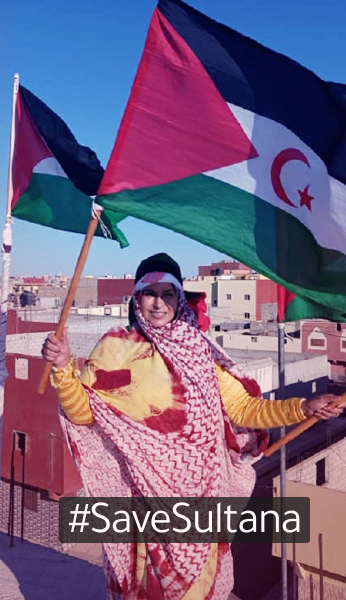While Morocco does not give any information about its military actions in the conflict resumed by its army and the Saharawi People’s Liberation Army, its agents target the Saharawi media, and in particular independent journalists.
Social networks are one of the few means that Saharawis have of meeting virtually, organizing and expressing themselves.
Since November 13, date of the resumption of the fighting in Western Sahara, network accounts of several Saharawis in the occupied territories, in the refugee camps or elsewhere in exile, have been or are temporarily – and for varying periods of time – inaccessible or restricted.
In the territory militarily occupied by Morocco, the following bloggers and activists have been restricted or banned from using their Facebook accounts.
El Mammia Habibi, a student blogger living in occupied Boujdour, was barred from activity on her Facebook account for a month following “reports”. She is however sure that she has respected the vocabulary and message rules in her posts. The content of its information reflects reality, that is the resumption of the war due to the plunder of the natural resources of Western Sahara by Morocco, with at least the collaboration of Europe, Russia, New Zealand, India, China, Turkey…
Moulay Lehssan Douihi lives in occupied El Aaiun. He is one of the most influential Saharawi bloggers on social networks. He has been threatened several times through messages, but he has continued to express himself on the networks and disseminate information on the evolution of the military operations carried out by the Polisario Front since November 13.
“I posted in a respectful and peaceful manner. But the Moroccan services do not like what I say. They do not want Moroccans to find information on the war. They reported me and I can no longer access my account. Facebook’s punishment is based on false claims. For 7 days I will not be able to publish or distribute information”.
Babouzayed Mohamed Said, President of the Saharawi association CODESA, from occupied El Aaiun, has also been banned from his account for a week.
Baih Jamaa is a blogger and a human rights activist. He lives in El Aaiun and he also was banned from activity on his Facebook account for a week.
Isalmou Etaoubali is also a blogger from El Aaiun who has shared information about the war and about the movement restrictions, oppression and surveillance imposed on Saharawi civilians since November 13. He has been reported and prevented from posting for a week.
Saharawi activists who convey or write information are also targeted throughout the world.
Said Zeroual, editor-in-chief of the website futurosaharaui.net, is not allowed to post live videos for one month on his Facebook account. Written posts have been blocked for 24 hours. He is active from Sweden.
Mohamed Limam Dih lives in Spain. He is a member of Équipe Média, a Saharawi independent press agency from the occupied territory. He has been sporadically prevented from posting on his Facebook account. Lately he has been unable to access his account for 24 hours.
The administration of Facebook has justified these prohibitions of expression in a lack of respect to its regulations. However, the information published only concerns the Saharawi cause, exchanges of news about the conflict and its classification by the UN as a decolonization case, just as before the resumption of the war. It is very likely that the “reports” that led to the restrictions are the work of Moroccan services, as some videos exceed one million views.
Bachir Mohamed El Hassan, editor of espanaenarabe.com, specialized in immigration and terrorism, was also banned from posting live videos for a month. The alleged Moroccan services have particularly pointed out his remarks on the war and on Morocco’s silence about human losses and material damage in its army. He lives in Spain.
Zaini Talb, a Saharawi blogger living in Canada, and El Ghouth Said, a journalist from the refugee camps reporting to the Saharawi Press Agency, have not been able to access their Facebook accounts for 48 hours following their publication of the SPLA military statements.
Ali Bouya Ettafah Moussa is a blogger activist. He lives in Spain. His Facebook account has many followers. He gives information about the war of the berm and the silence of the Moroccan media. “Social networks are the true weapons that can dispel any ambiguity about what is happening in Western Sahara. I regularly post statements from the SPLA as well as information and interviews with Saharawi fighters. My goal is to stop Moroccan propaganda and its permanent deception”. His account was suspended for 7 days.
When Moroccan silence and its ability to stifle and deny the reality of the conflict, of international law and of the war are supported by the so-called free communication systems between human beings, then one may suspect that these means are not as independent nor free as they claim. It seems that it is possible to put a price to their complicity in silence and injustice.
Équipe Média, December 11, 2020
El Aaiun, Western Sahara occupied.




